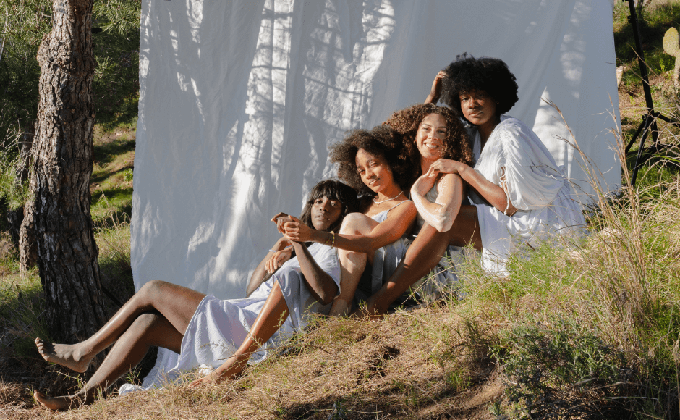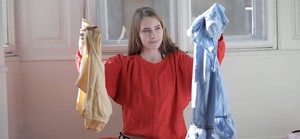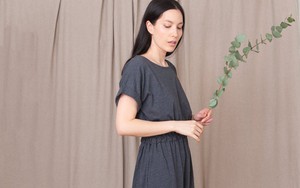- Clothes
- Bags
- Accessories
-
Inspiration
- Shoes
What Makes Fashion Brands Sustainable? + Examples

You keep hearing and reading about "sustainable clothes” but what does that mean in practice? What makes a fashion brand sustainable?
Overall, these companies strive for the lowest possible environmental footprint, creating clothes in a way that’s fair towards their workers, consumers, and the planet.
Things are rarely black and white in this industry, though. So, it’s tricky to come up with a definition that works for everyone.
Instead, we thought we’d show you different things that can make a fashion brand sustainable.
That way, you can focus on those that align with your preferences—without falling for the trickery of fast fashion brands that pretend to be ethical.
Examples of what makes a clothing brand sustainable

1. It's a slow fashion brand
Fast fashion is all about mass-producing low-quality and cheap clothes to follow the newest trends. So, with their weekly micro-seasons (yes, really), these brands push consumers to buy new garments regularly, only wear them a couple of times, and then discard them—without worrying about the consequences.
On the contrary, slow fashion brands encourage their customers to invest in higher-quality clothes that are made to last and that go beyond trends. That way, you’ll reduce waste and get out of the vicious cycle of needing new garments to stay “trendy”.
Some of them take this one step further (or slower?) by only making clothes to order.
For example, some sustainable slow fashion brands are:
- Vanilia, a Dutch-based womenswear brand
- The Launch, launching monthly small batch collections on a made-to-order system
- Alohas, creating the most amazing pieces and working with a pre-ordering system to avoid overproduction
2. It produces in an eco-friendly way, choosing sustainable fabrics, materials, and practices
The initial material production stage is usually the most detrimental to the environment, especially when a brand is trying to cut costs. For example, fast fashion brands rely heavily on traditional cotton and polyester, which are some of the WORST.
Instead, sustainable brands focus on eco-friendly fabrics like hemp, linen, organic cotton or even recycled materials to reduce waste.
Some of them choose better alternatives for other materials or stages of their supply chain, too—like using renewable energy and plastic-free packaging.
When looking for kind materials, though, put them into perspective and ask yourself: “Is this greenwashing?”
This is because some fast fashion brands brag about using a tiiiiny bit of organic cotton or recycled polyester… but then rely on overproduction, a polluting production process, and sweatshops.
Some sustainable and eco-friendly brands are:
- Saywood, the female-founded slow fashion pioneer
- MUD Jeans, which saves water while also designing denim items with circularity in mind
- Komodo, that prioritises the kindest materials and certified factories
3. It produces clothes in a fair and ethical way
Sustainable fashion tends to focus on the environment, whereas ethical fashion is more about the humanitarian side of things. But we don’t believe you can have one without the other!
So, who made the clothes you’re buying?
To keep their prices so low, fast fashion brands often rely on sweatshops that hide abuse, underpaid workers, unsafe working conditions, and even child labour.
Instead, ethical brands pay and treat their workers well (that’s one of the reasons why these clothes tend to cost more). Because they have nothing to hide, they’re transparent about their supply chain, too.
Some of them go the extra mile by giving back or supporting a good cause, like donating a percentage of their profits to charity.
Overall, some sustainable brands that produce their clothes in an ethical way are:
- Bibico, which uses certified cooperatives where women work their way out of poverty
- Infinitdenim, whose clothes are made in a Spanish workshop entirely run by women
- Loft & Daughter, a jewellery and lifestyle brand that gives work to vulnerable and displaced artisans
4. It keeps production local
Most fashion brands (and that actually includes plenty of ethical ones, too) produce their clothes in developing countries. This helps them keep their costs and prices lower. But longer supply chains = a higher environmental footprint.
Luckily, though, some sustainable brands are also reducing their carbon emissions and supporting local economies by keeping their production closer to home, like:
- Brava Fabrics, a Spanish brand producing in Madrid and Europe
- AmourLinen, whose timeless and made-to-order linen clothes are handcrafted in their own factory in Vilnius
- Fanfare Label, which produces in Europe and prioritises local materials, including textiles saved from landfills
5. It’s vegan and cruelty-free
From an eco-friendly perspective, it’s a tough one because vegan alternatives aren’t always better for the environment. For example, take the leather vs vegan leather debate: the latter is often made with non-biodegradable plastic.
However, from an ethical point of view, it’s a no-brainer. With vegan brands, no animals need to die or suffer for your clothes. Plus, nowadays, there are lots of more eco-friendly cruelty-free options too, like fruit-based leather.
Some sustainable vegan brands are:
- Plant Faced Clothing, with a wide range of items and especially streetwear
- Good Guys Go Vegan, a cool vegan shoewear brand
- Reistor, which focuses on hemp and keeps its entire production vegan
Find more sustainable clothing brands on Project Cece

As you now know, there are lots of things that can make a fashion brand sustainable.
So, we recommend focusing on what matters the most to you and, ideally, on brands that tick more than one box.
But how can you do that without falling for greenwashing or wasting hours browsing different online stores?
Simple: right here on Project Cece!
We brought hundreds of fair trade brands in one place and included filters to simplify your choices (like Certificates and Materials).
Finding the right sustainable fashion brands for your style and ethos has never been easier!
Share our story
Related articles
How to Buy Sustainable Clothes: 6 Questions Before a Purchase
It goes beyond finding eco-friendly garments! Here’s how to buy sustainable clothing through 6 questions, from mindset to your wardrobe and how you use it.
How to Check if a Brand is Sustainable: 7 Effective Tricks
Enough with greenwashing! Here’s how to tell if a brand is actually as sustainable as it sounds or just another fast fashion company pretending to be ethical.
What Is Sustainable Fashion, Exactly? Jargon-Free Guide
Eco-friendly? Ethical? It can all sound confusing at first. So, here’s what sustainable fashion is in practice, why it matters, and how YOU can get started.
Project Cece is a platform that collects ethical fashion from vetted brands and shops in one place. Browse ethical fashion for women and men and find items that fit your style, budget and values!
_large.png)


